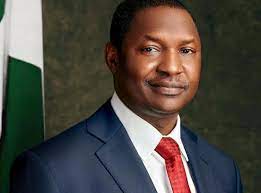Nnamdi Kanu, the leader of the outlawed Indigenous People of Biafra (IPOB), was detained through collaborative efforts, according to Attorney-General of the Federation (AGF) Abubakar Malami.
Malami, who did not go into detail about the operation that led to the arrest of the fugitive IPOB leader, told journalists in Abuja on Tuesday that Nigerian intelligence and security services worked jointly.
“Nnamdi Kanu, the self-declared leader of the outlawed secessionist Indegenous People of Biafra (IPOB), has been aided by Nigerian intelligence and security services.”
“He has been brought back to Nigeria in order to continue facing trial after disappearing while on bail regarding 11 count charge against him.
“Recent steps taken by the Federal Government saw to the interception of the fugitive Kanu on Sunday the 27th day of June, 2021.
“Nwannekaenyi Nnamdi Ngozichukwu Okwu-Kanu, born 25th day of September, 1967 at Afaraukwu, Abia State is a holder of Nigerian Passport No. A05136827 first issued 17th October 2013 at FESTAC, Lagos.
“It is recalled that Kanu was arrested on 14th October, 2015 on 11 count charge bordering on terrorism, treasonable felony, managing an unlawful society, publication of defamatory matter, illegal possession of firearms and improper importation of goods, among others.
“A judge at the Federal High Court, Abuja revoked Kanu’s bail that was granted him on health ground and issued a bench warrant for his arrest on the same date, over his failure to appear in court for hearing.
“He has, upon jumping bail, been accused of engaging in subversive activities that include inciting violence through television, radio and online broadcasts against Nigeria and Nigerian State and institutions.
“Kanu was also accused of instigating violence especially in the Southeastern Nigeria that resulted in the loss of lives and property of civilians, military, para military, police forces and destruction of civil institutions and symbols of authorities.”

